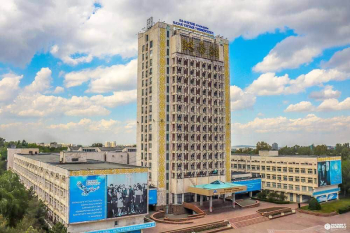The Scientific Library of Al-Farabi Kazakh National University was founded simultaneously with the university in 1934. By order of the rector dated June 26, 2014, No. 281, the name of the scientific library was changed to the “Al-Farabi Library.”
Mission of the Al-Farabi Library:
- To create and maintain a developing information environment that promotes learning, research, and innovation at Al-Farabi KazNU.
- To strive for excellence in services, strategies, and systems that contribute to the discovery, preservation of knowledge, and enhancement of global scientific communication.
- To promote information literacy.
- To foster cultural growth for each user in a modern and dynamic atmosphere.
- To enrich experiences and expand opportunities.
Priorities of the Al-Farabi Library:
- Providing resources for the study of new professional skills.
- Constant expansion of electronic collections and resources.
- Gradual increase of virtual services.
- Working to make technologies more accessible and useful for those who need them the most.
- Collaborating with partners to ensure accessibility and education.
- Expanding the integration of digital technologies.
Library Vision:
The Al-Farabi Library is an integral classical and virtual structure of the university, bringing together a diverse community and providing access to information, collections, and infrastructure.
Library functional zone
The total area of the Al-Farabi Library is 17,846.1 m².
The educational and information space includes the electronic and reading rooms, a coworking space, thematic rooms, subscription areas, and book storage.
- Electronic Library Hall: With a total area of approximately 1000 m², it has 240 seats. Link to Electronic Library
- Classic Reading Room: The reading room has an area of 1718.8 m² with 750 seats. Additional reading rooms are located at the university buildings on Masanchi and Karasai Batyr streets, with an area of 660.8 m². Link to Classic Reading Room
- Subscription Desk: Operates on a “one-stop” principle, serving all readers of the university regardless of their faculty.
- Main Book Fund: The book storage area of 3363 m² is located on the basement floor. Restoration work is carried out on books, including bookbinding repairs and the binding of newspaper archives kept permanently in the library.
- Rare Books and Manuscripts Hall named after Academician Abstatir Derbisali: The fund contains rare books and manuscripts in various fields of science, dating from the 18th century to the early 21st century. These include publications of historical, cultural, and scientific value, as well as printed books in Arabic, Latin, and Cyrillic scripts.
- Dissertation Hall. The hall houses dissertations and their abstracts defended at the university since 1938. The collection of the hall contains 21,053 copies of dissertations in the fields of humanities, natural sciences, and socio-political studies in Kazakh, Russian, and foreign languages.
- First President Hall: Opened for the 25th anniversary of Kazakhstan’s independence, this hall serves as an educational center that aims to create, continuously update, and preserve information related to the history of Kazakhstan’s independence. Link to First President Hall
- Abai Hall: A thematic hall dedicated to the great Kazakh poet, philosopher, educator, translator, and composer, Abai Kunanbaev. The hall includes an exposition and an art gallery dedicated to his life and work. Link to Abai Hall
- Coworking Space (Room 304): Designed for group and individual lessons, video lessons, and training sessions. Link to Coworking Space
- Institute of Turkology and Altai Studies: The institute is engaged in the study of rare books, manuscripts, and other materials in the library’s collection.
- Communication and Exhibition Space: Includes conference halls located on the 4th floor, as well as the hall, lobby, and foyer on each floor of the library. Links to Communication Space Link to Foyer Link to Hall Link to Conference Room
- Al-Farabi Center: Focused on studying the scientific heritage of the great philosopher and encyclopedic scholar Abu Nasir al-Farabi, and the Al-Farabi Museum, which is dedicated to his life and activities.
- “Ұлы дала” (Great Steppe) Exhibition: Showcases historical artifacts found in present-day Kazakhstan, demonstrating the advanced technologies of our ancestors.
- “Алаш мұраты” (Ideals of Alash) Exhibition: Reveals the prominent figures of the Alash movement who fought for the independence of Kazakhstan in the early 20th century.
- “Мәңгілік ел” (Eternal Nation) Composition: The exhibit aims to highlight the free-spirited nation’s aspirations for a bright future, with portraits of historical figures who contributed significantly to the formation of an independent Kazakhstan.
- Conference Rooms: The library has several conference rooms with capacities of 300, 80, and 60 seats, equipped with modern technical equipment for various events.
Administrative and Service Areas
In the administrative-production zone of the library, there are service departments, auxiliary and administrative rooms.
- Global Hub Office of the UN “Academic Impact” Program: The Global Hub at KazNU is the first and only university in the CIS to be granted this status. As one of 10 global hubs of the UN, KazNU coordinates and actively engages the global academic community in the realization of the 17 Sustainable Development Goals of humanity, focusing on resource conservation, quality education, well-being, innovation, ecosystem preservation, and more.
- Communication and Relaxation Area: Includes a café with 75 seats, a luggage storage room, and a cloakroom.
This translation provides a comprehensive overview of the facilities, mission, and key zones of the Al-Farabi Library, highlighting its important educational, research, and cultural roles within the university and the broader community.



